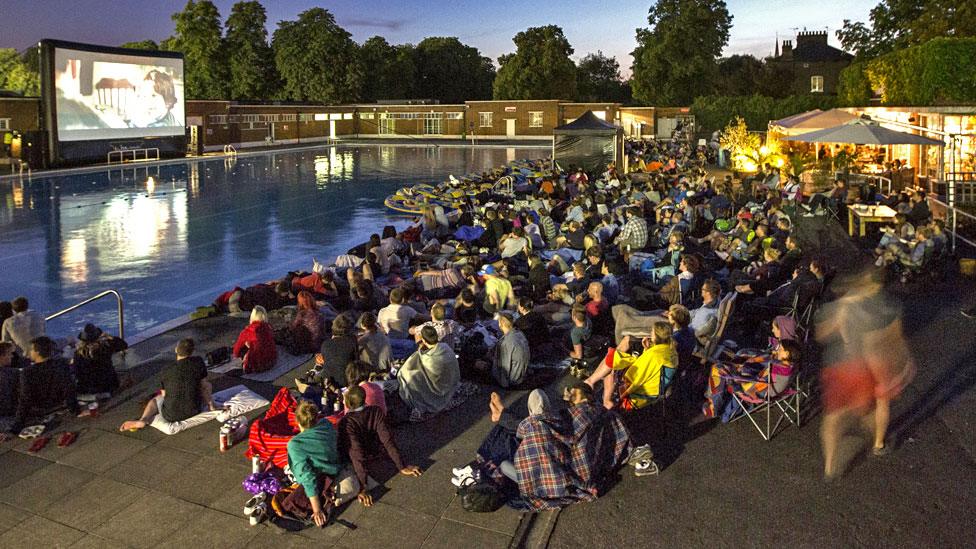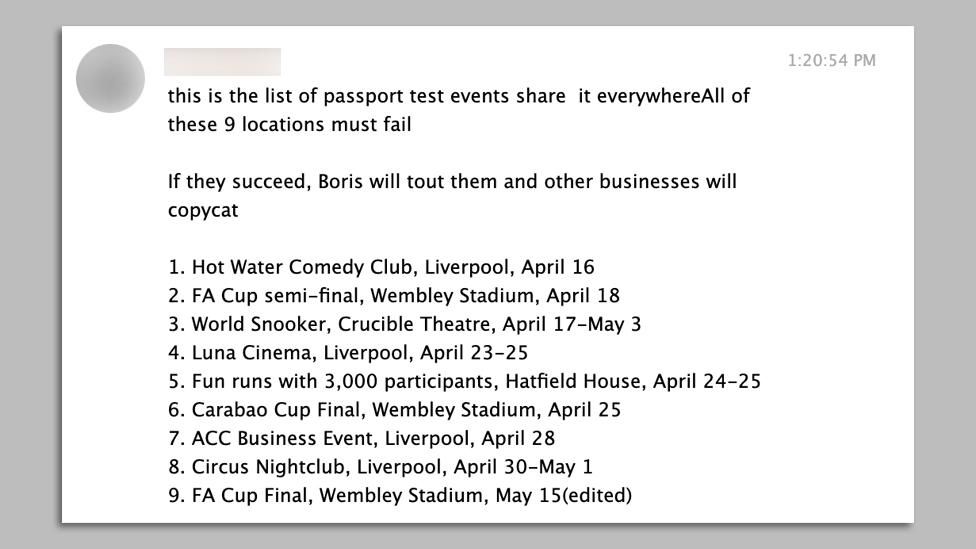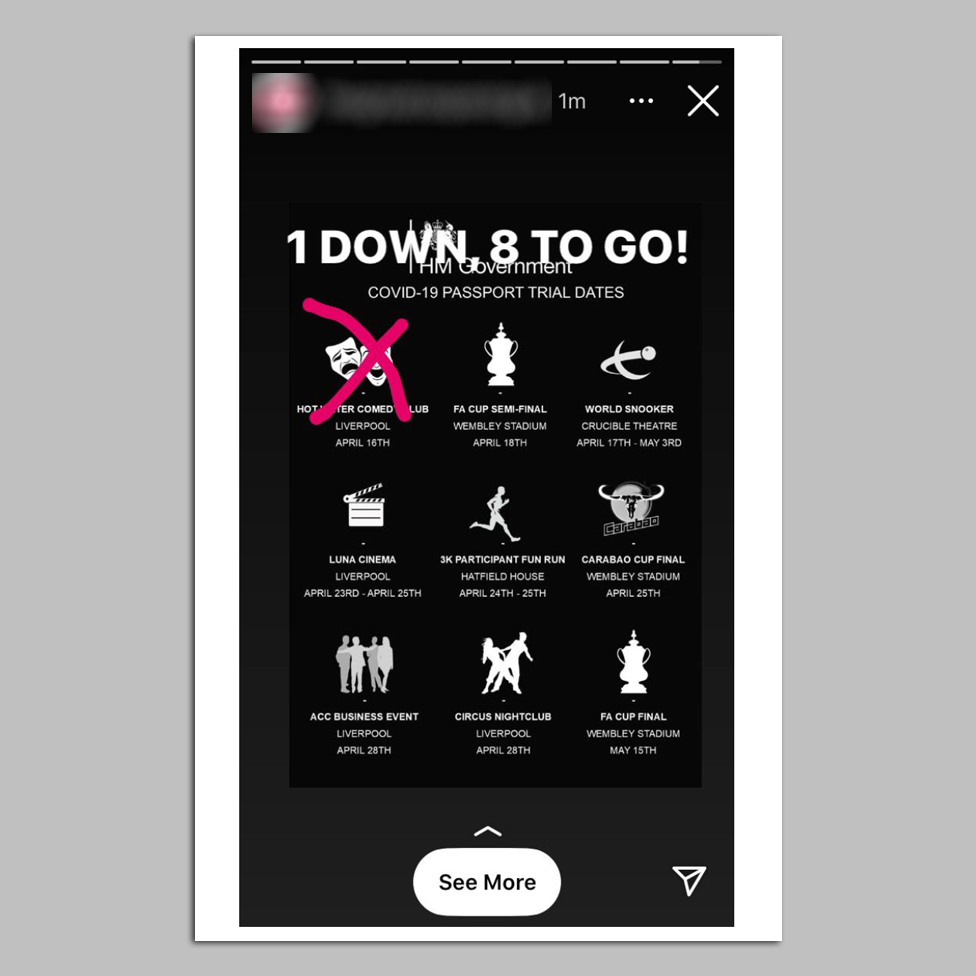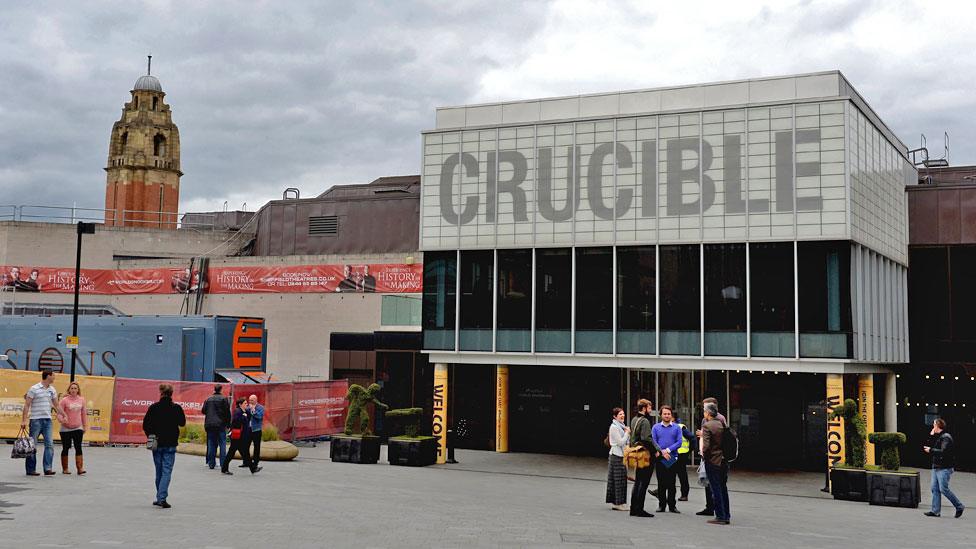Cinema and big event organisers targeted by extreme anti-vax activists
- Published

Sunday's FA Cup semi-final at Wembley Stadium is one of a number of mass event trials being held across the country
Anti-lockdown and anti-vaccine activists have used online groups to circulate the personal details of people helping to run cinema and other large-scale event trials. It's prompted some people to send abusive messages.
"We must be approaching about 300 emails accusing us of things like being a part of a 'medical apartheid.'"
George Wood is managing director of The Luna Cinema, which runs open-air film events. He agreed to participate in the government's pilot scheme to restart large-scale gatherings - but he didn't expect to receive abuse for doing so.
The emails accuse Luna of being part of a "vaccine passport" scheme - even though attendees won't have to show proof of vaccination, only evidence of a recent negative Covid-19 test.
The abuse includes personal attacks and even messages comparing the organisers to Nazis.
"These claims are so ridiculous," says Mr Wood. "The staff are being distressed by it.
"We are doing something positive for the industry," he says. "We're helping return the freedoms that have been removed by Covid."
Mr Wood says that many of the people writing in used the same slogans and phrases, which seemed to indicate a co-ordinated campaign. And he says some of the more extreme messages have been referred to the police.

The Luna Cinema is participating in mass event trials
Harassment
The targeting of The Luna Cinema isn't unique. The BBC has seen details posted online - including phone numbers and email addresses - of several people involved in a number of the mass event pilots.
In one group of nearly 16,000 people on the chat app Telegram, contact details of organisers of the events were for a time pinned to the top of the chat. The group itself is devoted to Covid-19 and vaccine conspiracy theories.
One post reads: "Help Kill The Government Trials That Will Inevitably Bring In Vaccine Passports", and goes on to list contact email addresses for organisers.
Other posts, like this one, declare that the events "must fail":

While the messages avoid specific calls to action, participants in the chat are prodded with phrases like "YOU KNOW WHAT TO DO". As Mr Wood's experience shows, some may interpret that as a sign to send abuse.
What are the pilots?
The government is collecting data and research, external from a number of pilots around the country, including Sunday's FA Cup semi-final at Wembley Stadium, the World Snooker Championships in Sheffield and a number of other smaller events.
Findings from these events on testing, social distancing and ventilation will inform how mass venues can reopen safely after 21 June, when all lockdown measures are currently planned to be lifted.
The government's initial statement on the pilots referred to "Covid-status certification". However that phrase appears to have initially caused some confusion, with some interpreting it as a signal that participants would be required to show proof of a Covid vaccination.
One venue, Liverpool's Hot Water Comedy Club, pulled out from the trial because of abuse over inaccurate reports it was involved in a "vaccine passport" trial.
The cancellation was cheered in anti-vaccine groups.

Fringe anti-lockdown campaigners celebrated when one of the trials was cancelled
While there has been debate about the ethics of "vaccine passports" and the government has launched a review into Covid-status certification, external, the only requirement for entry into the mass event trials is a negative Covid test.

Another trial is being held at the World Snooker Championships in Sheffield
'Covid passports'
As the exact requirements for the trials have become clearer, however, chat in more extreme anti-lockdown, anti-vaccine groups hasn't subsided. Instead, people consistently talk about the trials bringing in "vaccine passports" by the back door.
Posts contain a range of suspicions - from mainstream worries about discrimination, all the way to hard-core conspiracy theories that the pandemic is somehow a "hoax" or has been "fabricated", alongside patently false assertions that vaccines are harming and killing millions.
Some claim, again falsely, that Covid testing itself is somehow dangerous. There is also content from far-right activists.
"In terms of the broader Covid conspiracy and anti-lockdown groups, threats and potential violence against people who may be talking about how society changes because of Covid are quite common," says Ciaran O'Connor, an analyst at the Institute for Strategic Dialogue.
"The thing about Telegram is that it's anonymous. Hate and anger is not only encouraged but also orchestrated in these spaces," adds Mr O'Connor. "You don't have to dig deep."
The BBC has contacted Telegram for comment.